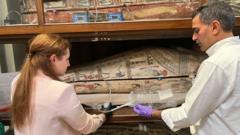Researchers discovered that mummies from ancient Egypt, despite being over 5,000 years old, emit pleasant scents reminiscent of natural fragrances. The study, involving scientists from UCL and the University of Ljubljana, aims to reconstruct these smells for exhibition purposes, providing a novel way for visitors to engage with history while also aiding in the preservation of ancient remains.
Ancient Egyptian Mummies Emit Pleasant Scents, Research Reveals

Ancient Egyptian Mummies Emit Pleasant Scents, Research Reveals
A study finds that mummified Egyptian bodies possess "woody," "spicy," and "sweet" aromas, challenging perceptions of mummies and enhancing conservation efforts.
In a groundbreaking study, scientists have revealed that ancient Egyptian mummies, entombed more than 5,000 years ago, still emit pleasant odors. Researchers analyzed nine mummies and noted that while some variations in scent intensity exist, the overall aromas were categorized as "woody," "spicy," and "sweet." This anticipated olfactory experience is set to be showcased at the Egyptian Museum in Cairo, as part of an initiative to immerse visitors in the historical significance of mummification.
Dr. Cecilia Bembibre, one of the study's authors, emphasized the importance of sharing the sensory experience derived from smelling these mummified bodies. She highlighted that the ancient Egyptians considered the presence of fragrant oils and balms vital for preparing their deceased for the afterlife. Contrastingly, popular media often depicts horrific consequences associated with mummies, making the researchers' findings particularly surprising.
The study, recently published in the Journal of the American Chemical Society, utilized a non-invasive technique that allowed the team to extract the scent from inside the sarcophagus without disturbing the remains. This innovative approach underscored the commitment of heritage specialists to utilize non-destructive methods in their research.
Engaging with smells can evoke powerful emotional responses, as noted by Ally Louks, a Cambridge University academic. She described the sensory engagement as an innovative method to communicate historical narratives, highlighting the significance of smell in ancient Egyptian social and religious contexts.
Beyond providing a unique experience for museum-goers, the research has significant implications for mummy conservation. By using gas chromatography to analyze the odors, researchers identified indicators of potential decomposition related to the animal fats used in embalming. This knowledge is invaluable for conservators, allowing them to develop more effective preservation techniques for future generations.
As Matija Strlič, another researcher involved in the study, pointed out, the findings may also help discern the social status of mummies based on their scents. The potential application of this research extends beyond mummies, opening avenues for similar inquiries into other museum collections, thereby enriching collective historical understanding.























